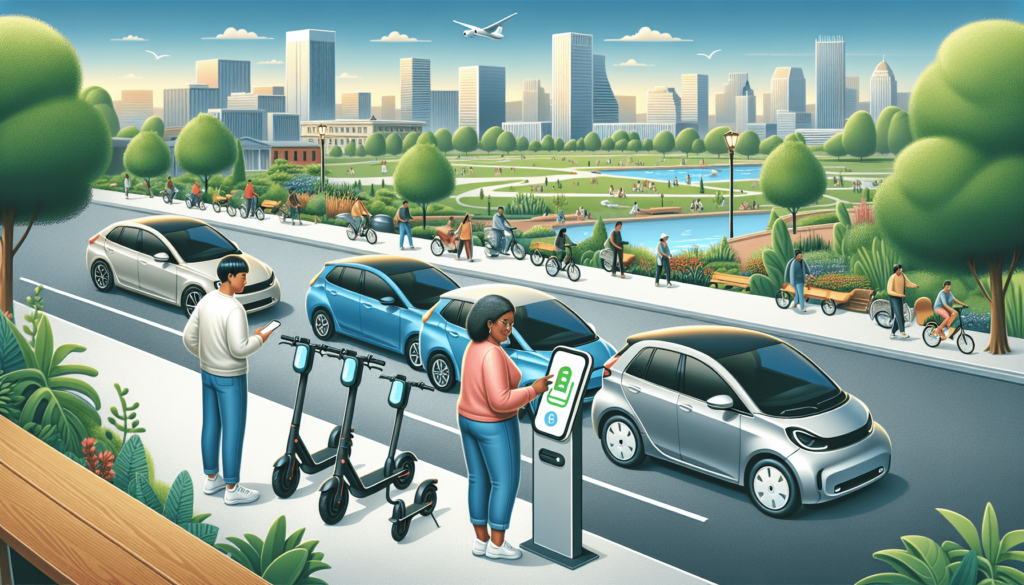Welcome to the exciting world of sustainable transportation! In recent years, there has been a growing interest in promoting electric vehicle sharing as a way to reduce carbon emissions and promote eco-friendly modes of transportation. Many cities and organizations around the world have initiated programs to encourage the use of electric vehicles for shared mobility, providing convenient and environmentally-friendly options for commuters. Let’s explore the various initiatives and innovations that are paving the way for a more sustainable future in transportation. Are there initiatives to promote electric vehicle sharing for sustainable mobility?
The Rise of Electric Vehicles in Sustainable Transportation
Electric vehicles (EVs) have gained immense popularity in recent years as a means of promoting sustainable transportation and reducing greenhouse gas emissions. With advancements in technology and improved infrastructure, EVs have become a viable alternative to traditional gasoline-powered vehicles. One of the key initiatives to enhance the adoption of EVs is the concept of electric vehicle sharing programs. These programs allow individuals to rent and share electric vehicles for short-term use, reducing the need for private car ownership and promoting sustainable mobility.
What Is Electric Vehicle Sharing?
Electric vehicle sharing, also known as EV sharing, is a service that allows users to access electric vehicles for short periods of time, typically on an hourly basis. Users can locate, reserve, and unlock electric vehicles through a mobile app or a membership card, making it convenient and cost-effective for short-distance trips. EV sharing programs are often operated by private companies, municipalities, or transportation agencies, and they aim to provide a sustainable transportation option for urban residents.
How Does Electric Vehicle Sharing Work?
Electric vehicle sharing works on a simple and user-friendly platform. Users can sign up for an account with an EV sharing service provider, download the mobile app, and browse available electric vehicles in their area. Once a vehicle is selected, users can reserve it for a specific time period and receive the location and access details. Users can then unlock the vehicle using the app or a membership card, drive to their destination, and return the vehicle to a designated parking spot at the end of the rental period. Payment is typically based on usage time, distance traveled, or a combination of both.
Benefits of Electric Vehicle Sharing
Electric vehicle sharing offers a myriad of benefits for users, cities, and the environment. Some of the key advantages include:
- Reduced Carbon Emissions: By replacing gasoline-powered vehicles with electric ones, EV sharing programs contribute to lower greenhouse gas emissions and improved air quality.
- Cost-Effective Transportation: EV sharing provides a cost-effective alternative to private car ownership, especially for short-distance trips in urban areas.
- Convenient and Flexible: Users can access electric vehicles at their convenience, without the hassle of maintenance, parking, and insurance associated with private cars.
- Promotes Sustainable Mobility: By encouraging the use of electric vehicles, EV sharing programs promote sustainable mobility and reduce dependence on fossil fuels.
- Reduces Traffic Congestion: Shared electric vehicles can help reduce traffic congestion in cities by encouraging carpooling and public transportation use.
Initiatives Promoting Electric Vehicle Sharing
Several initiatives are being implemented worldwide to promote electric vehicle sharing and enhance sustainable mobility. These initiatives are aimed at increasing awareness, expanding infrastructure, and incentivizing users to embrace electric vehicle sharing as a viable transportation option.
Public-Private Partnerships
Public-private partnerships play a crucial role in promoting electric vehicle sharing programs. By collaborating with local governments, transportation agencies, and private companies, EV sharing service providers can access funding, infrastructure support, and regulatory guidance to expand their operations. Public-private partnerships also help in developing innovative solutions for charging infrastructure, vehicle deployment, and user engagement to enhance the overall user experience.
Incentives and Subsidies
Governments and municipalities around the world are offering incentives and subsidies to promote electric vehicle sharing and increase adoption rates. These incentives may include tax credits, rebates, reduced registration fees, and free parking for electric vehicles. By providing financial incentives, governments encourage individuals and businesses to choose electric vehicle sharing over traditional gasoline-powered vehicles, thus contributing to a cleaner and greener environment.
| Country | Incentive Type | Description |
|---|---|---|
| United States | Tax Credits | Offers federal tax credits of up to $7,500 for the purchase of electric vehicles |
| Norway | Registration Fee Waivers | Provides full exemption from registration fees and road tolls for electric vehicles |
| China | Subsidies | Provides subsidies for the purchase and operation of electric vehicles to promote sustainable transportation |
Infrastructure Development
Infrastructure development is a key component of promoting electric vehicle sharing programs. Charging stations, parking facilities, and vehicle maintenance centers need to be strategically located to ensure easy accessibility for users. Governments, municipalities, and private companies are investing in expanding the charging network, upgrading grid capacity, and developing smart charging solutions to support the growth of electric vehicle sharing programs.
Public Awareness Campaigns
Public awareness campaigns play a pivotal role in educating the public about the benefits of electric vehicle sharing and encouraging them to make the switch to sustainable transportation. Through advertising, marketing initiatives, and community engagement events, EV sharing service providers can raise awareness about the environmental, economic, and social advantages of using electric vehicles. Public awareness campaigns also help in dispelling myths, addressing concerns, and building trust among potential users.
Collaborations with Ride-Hailing Services
Collaborations between electric vehicle sharing programs and ride-hailing services are becoming increasingly popular to promote sustainable mobility. By integrating electric vehicles into ride-hailing fleets, users have the option to choose environmentally friendly transportation options for their daily commutes. This partnership also allows ride-hailing services to lower operating costs, reduce emissions, and attract environmentally conscious customers who prefer electric vehicles over traditional gasoline-powered vehicles.

Case Studies of Successful Electric Vehicle Sharing Initiatives
Several cities and regions around the world have successfully implemented electric vehicle sharing programs to promote sustainable mobility and reduce carbon emissions. These case studies highlight the impact of EV sharing initiatives on urban transportation systems, air quality, and user behavior.
Paris, France: Autolib’
Autolib’ is a popular electric vehicle sharing program in Paris, France, that offers a fleet of electric cars for short-term rentals. Launched in 2011, Autolib’ has gained immense popularity among urban residents and tourists as a convenient and eco-friendly transportation option. With over 4,000 electric vehicles and 1,000 charging stations across the city, Autolib’ has significantly reduced greenhouse gas emissions, traffic congestion, and noise pollution in Paris.
San Francisco, United States: Scoot Networks
Scoot Networks is a pioneering electric scooter sharing service in San Francisco, California, that provides users with access to electric scooters for urban mobility. Founded in 2011, Scoot Networks has revolutionized last-mile transportation in the city by offering a convenient, cost-effective, and sustainable alternative to private cars. With over 700 electric scooters and a growing user base, Scoot Networks has become a popular choice for daily commuters, tourists, and eco-conscious travelers in San Francisco.
Amsterdam, Netherlands: Share Now (Formerly Car2Go)
Share Now, formerly known as Car2Go, is a leading car-sharing service in Amsterdam, Netherlands, that offers electric cars for short-term rentals. With a diverse fleet of electric vehicles, including compact cars and electric bikes, Share Now provides users with a flexible and affordable urban transportation solution. By promoting electric vehicle sharing, Share Now has contributed to reduced congestion, improved air quality, and enhanced mobility options for residents and visitors in Amsterdam.
Future Outlook for Electric Vehicle Sharing
The future of electric vehicle sharing looks promising, with continued advancements in technology, infrastructure, and public policy driving the growth of sustainable transportation options. As more cities and regions embrace electric vehicle sharing programs, we can expect to see greater adoption rates, improved user experiences, and enhanced environmental benefits in the years to come. By leveraging public-private partnerships, incentives, and infrastructure development, electric vehicle sharing has the potential to revolutionize urban mobility and pave the way for a cleaner, greener future.
In conclusion, electric vehicle sharing programs play a pivotal role in promoting sustainable mobility, reducing carbon emissions, and enhancing urban transportation systems. With a focus on public-private partnerships, incentives, and infrastructure development, electric vehicle sharing initiatives are paving the way for a more sustainable and environmentally friendly future. By embracing electric vehicle sharing as a viable transportation option, individuals, cities, and governments can work together to create cleaner, greener, and more vibrant communities for generations to come.


